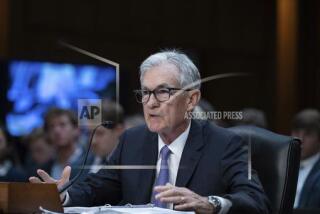Greenspan Sees Threat of Recession : Fed’s Chairman Says Economy Is Barely Growing
- Share via
WASHINGTON — Federal Reserve Chairman Alan Greenspan warned today the U.S. economy, reeling from Middle East oil shock, is barely growing and faces a real threat of recession.
In testimony before the Joint Economic Committee of Congress, Greenspan said rising petroleum prices after the Iraqi invasion of Kuwait have hurt the U.S. economy by boosting inflation and stunting a business expansion that began in 1982.
He gave no indication about the direction of interest rates, although he stressed that short-term rates could be expected to fall if President Bush and Congress agree on a five-year, $500-billion cut in the budget deficit.
Many mainstream economists contend the United States, which faced sluggish growth before the current oil shock, has already slipped into an economic downturn. But Greenspan cautiously disagreed.
“We are still growing at this particular stage, very slowly,” he said. “I don’t see as yet any hard evidence on an immediate, day-by-day basis we have tilted over into any significant deterioration (or recession).”
Chances of recession, Greenspan added, have “clearly risen with the onset of the crisis in the gulf, the oil shock. Whether or not it’s greater than 50-50, I think it’s actually too soon to say.”
It would be surprising, however, if consumers and businesses did not reduce spending, thus adding to recessionary pressures, in light of the gulf crisis, rising unemployment and slower economic growth, Greenspan said.
Greenspan’s remarks were made at a particularly difficult time for Federal Reserve Board policy-makers setting short-term interest rates. The Administration has pressured the Fed to ease credit conditions to fight the economic slowdown, but Fed governors also have been concerned with keeping inflation in check. Now, both inflation and recession are bigger problems.
The Fed chairman said that if crude oil prices average $30 a barrel over the next year, about $10 above the price before Iraq’s Aug. 2 invasion of Kuwait, the higher oil prices would likely lower economic growth by a full percentage point over a year’s time.
Greenspan said that a $10 per barrel jump in oil prices would add roughly $30 billion to the country’s annual import bill, draining away purchasing power from consumers and businesses.
He said that inflation will be boosted by up to 2 percentage points over the next year.
The government reported Tuesday that the first shock wave from the Persian Gulf had pushed consumer prices up by 0.8% in August and left inflation running at an annual rate of 6.2% so far this year, the fastest clip in nine years.
Greenspan was unwilling to tell lawmakers what the Fed intends to do regarding credit conditions.
Whether the Fed “will seek higher, lower, or unchanged interest rates will depend on the specifics of the situation, which are shifting day by day,” Greenspan said.
More to Read
Get the L.A. Times Politics newsletter
Deeply reported insights into legislation, politics and policy from Sacramento, Washington and beyond. In your inbox twice per week.
You may occasionally receive promotional content from the Los Angeles Times.









